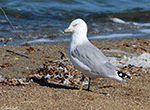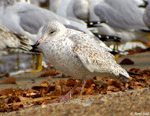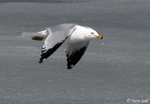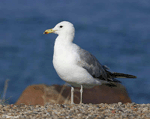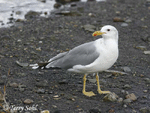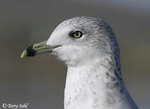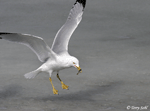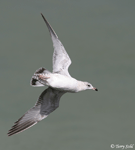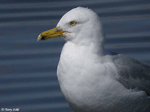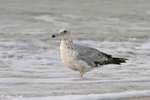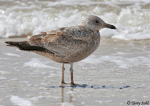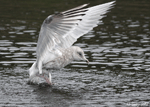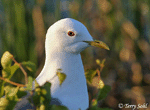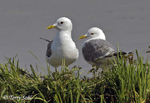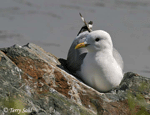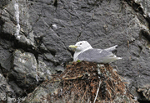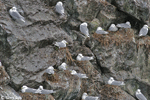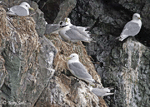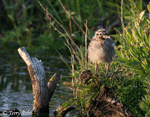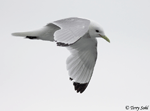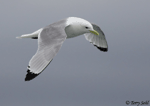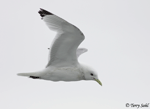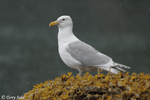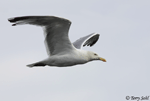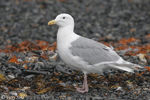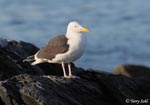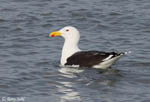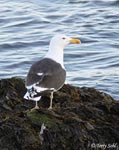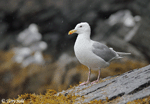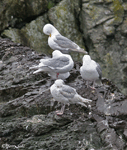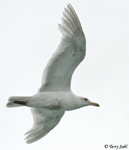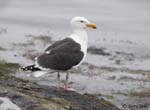NOTE: Simply put, one web page cannot adequately portray
the variety in plumages that occur between these species. Most take 3 or 4
seasons to reach adult plumage, with juvenile plumage changing each year.
Some species are very similar, to the point that there are numerous debates as
to which are individual species, which species should be lumped, etc.
To make matters even more confusing, several species of gulls hybridize,
producing intermediate offspring with potentially baffling characteristics.
With that said...the primary distinguishing features of adult birds are shown
below, with some remarks on juvenile birds where appropriate. 10 species
are listed here, but only a handful are regularly found in the state. The
Missouri River, it's large reservoirs, and particularly the open water below
Missouri River dams in the winter can attract significant numbers of gulls,
including the rarities shown on this page. The list of gull species
recorded in the state has even expanded in recent years, with a Glaucous-winged
Gull recently added to the state list, and even more exciting, an Ivory Gull
that spent a few weeks near Oahe Dam near Pierre. Scanning the large
flocks of gulls that are often found along the Missouri River may be tedious,
but a patient birder may well be rewarded with a very rare species for the
interior of the continent. |
|
Ring-billed Gull |
|
California Gull |
|
Larus delawarensis |
|
Larus californicus |
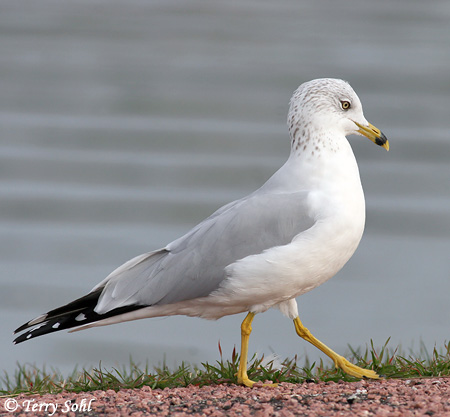
|
|
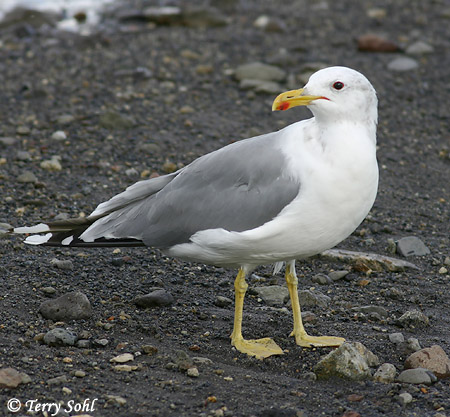
|
|
Length: 17-18 inches |
|
Length: 20-22 inches |
|
Wingspan: 48 inches |
Wingspan: 54 inches |
|
Bill: Yellow with black ring. First year birds have
pinkish bill with black tip. |
Bill: Yellow, with black and red spots on lower bill.
Juvenile birds bills' are similar to juvenile Ring-billed Gulls, red gape
(breeding) |
|
Legs and Feet: Yellow |
Legs and Feet: Greenish-Yellow.
|
|
Mantle: Quite pale |
Mantle: Darker gray than Ring-billed or Herring Gull. |
|
Wings:
Prominent black wing tips, with white spot near end. |
Wings: Large amount of black on outer primaries, with white
wing tips.
|
|
Head/Eye: Pale iris, thin red orbital ring in breeding plumage |
Head/Eye: Dark iris, thin red orbital ring (breeding),
streaking on non-breeding adult mostly on nape. |
|
South Dakota Status: Overall, generally the most common of the
species listed on this page. Found in any season near water, but in winter (as
with other gulls in the state), is typically found below the Missouri River dams
where open water exists. |
South Dakota Status: Breeds in small numbers in the northeast
and northwest part of the state. Rare migrant and summer visitor elsewhere
in the state. |
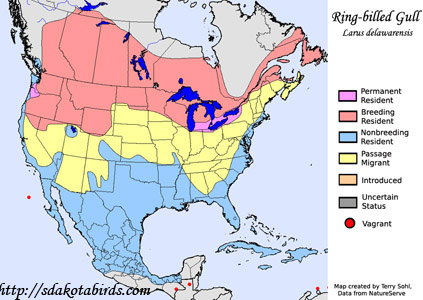 |
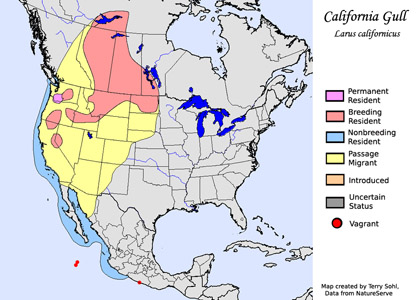 |
|
|
|
|
Herring Gull |
Thayer's Gull |
|
Larus argentatus |
Larus thayeri |
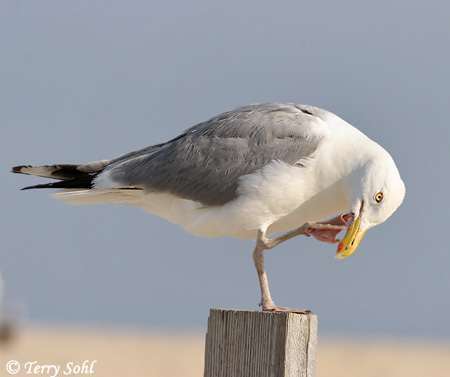
|
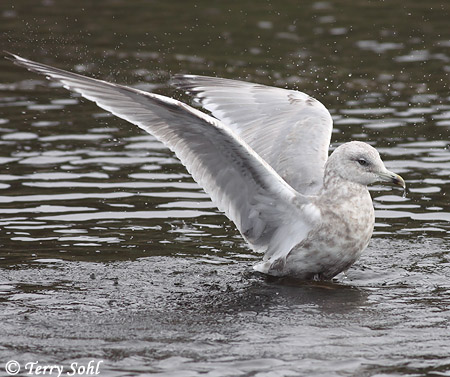
|
|
Length: 24-26 inches |
Length: 22-24 inches |
|
Wingspan: 56-60 inches |
Wingspan: 54-56 inches |
|
Bill: Yellow with red spot on lower bill, juveniles have
similar bill to California and Ring-billed Gulls, yellow gape (breeding) |
Bill: Yellow wing red spot on lower bill, juveniles similar to
other Larus juveniles. |
|
Legs and Feet: Pink |
Legs and Feet: Dark pink legs, lighter on juveniles |
|
Mantle: Relatively pale gray, comparable to Ring-billed Gull,
lighter than California Gull. |
Mantle: Mantle similar to Herring Gull |
|
Wings:
Dark wingtips, but not as prominent as California, not as contrasting and
strong as Ring-billed. |
Wings: Mostly white on underside of wingtips, upperside black
is primarily only on outer webs of the primaries |
|
Head/Eye: Pale iris, orangish orbital ring (breeding) |
Head/Eye: Most have a dark iris |
|
South Dakota Status: Locally common migrant.
Uncommon winter resident along the Missouri River, most often below dams where
open water exists. |
South Dakota Status: Rare migrant and winter visitor, mostly
along Missouri River below dams. Note bird above is likely 2nd-winter Thayer's,
but it's a possible Glaucous hybrid. |
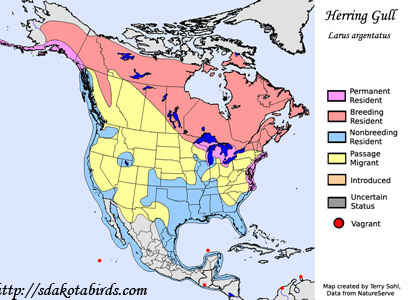 |
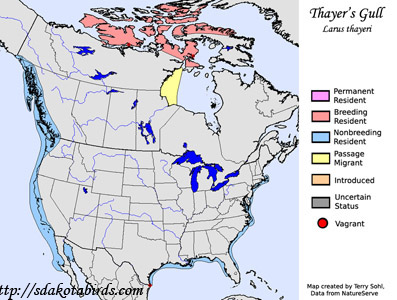 |
|
|
|
|
Mew Gull |
Black-legged Kittiwake |
|
Larus canus |
Rissa tridactyla |
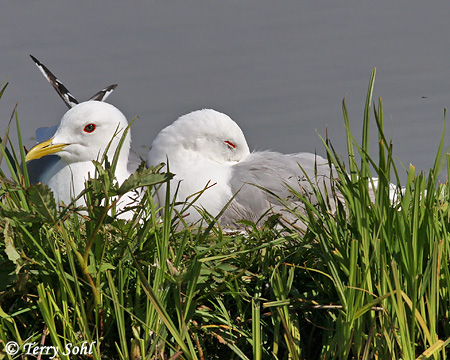
|
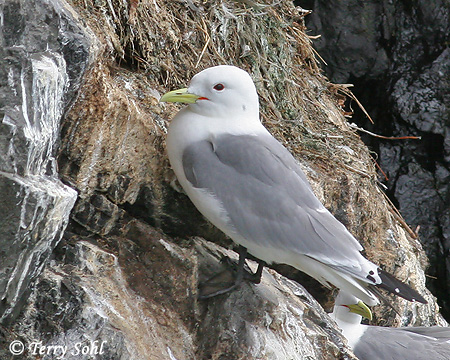
|
|
Length: 16-17 inches |
Length: 16 inches |
|
Wingspan: 42-44 inches |
Wingspan: 36 inches |
|
Bill: Adults have distinctive yellow bill without spots,
relatively thin compared to other Larus. |
Bill: Yellow bill without markings, although first-year birds
have black bill |
|
Legs and Feet: Yellow (pink in first-year birds). |
Legs and Feet: Distinctive black legs and feet |
|
Mantle: Slightly darker mantle than Ring-billed Gull |
Mantle: Similar in shade to Ring-billed. |
|
Wings: Limited black in wingtips compared to Ring-billed or
California, with large white spots. |
Wings: Pale primaries contrast with rest of wing, small black
wingtip without white spots. |
|
Head/Eye: Dark iris, red-orbital ring in breeding (see above
photo). |
Head/Eye: Dark iris, red-orbital ring (breeding), "ear spot" on
non-breeding adults (and juveniles) |
|
South Dakota Status: Rare visitor to South Dakota, most often
along Missouri River below dams. |
South Dakota Status: Rare visitor to South Dakota |
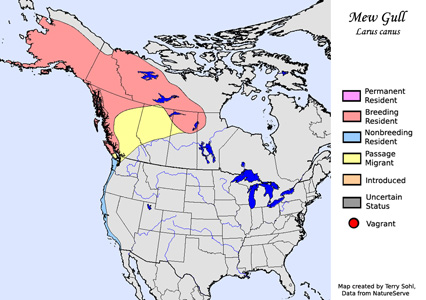 |
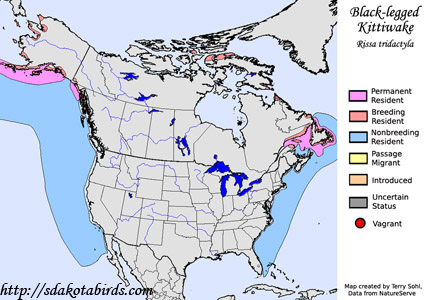 |
|
|
|
|
Iceland Gull |
Glaucous Gull |
|
Larus glaucoides |
Larus hyperboreus |
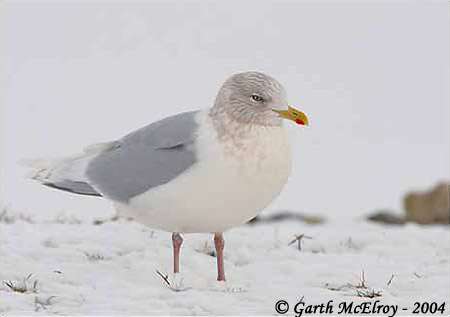
|
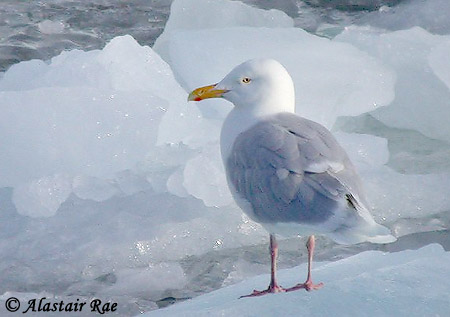
|
|
Length: 22 inches |
Length:
26-28 inches (noticeably larger than most Larus) |
|
Wingspan: 54 inches |
Wingspan: 60 inches |
|
Bill: Yellow bill with red spot on lower bill, juveniles
have similar bill to other Larus juveniles |
Bill: Yellow bill with red spot on lower bill. Longer and
more powerful looking bill than other Larus here. |
|
Legs and Feet: Pink |
Legs and Feet: Pink |
|
Mantle: Pale, noticeably so against similar Thayer's Gull |
Mantle: Very pale mantle |
|
Wings: Very pale, with very little, if any, black or dark
markings on primaries. |
Wings: Very pale at all ages, no markings in white wingtips |
|
Head/Eye: Pale yellow iris, purplish-red orbital ring
(breeding). Limited streaking in non-breeding adults compared to many
Larus gulls. |
Head/Eye: Clear yellow iris, bright yellow orbital ring
(breeding). Head appears flatter, less rounded than Iceland (see photos
above). |
|
South Dakota Status: Very rare visitor to the state |
South Dakota Status: Uncommon migrant and winter visitor,
primarily along Missouri River and its reservoirs. |
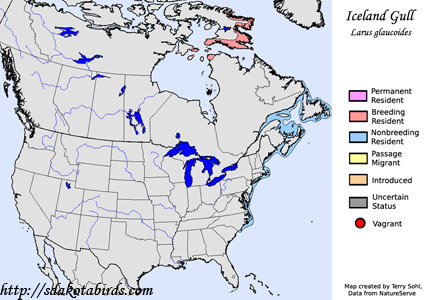 |
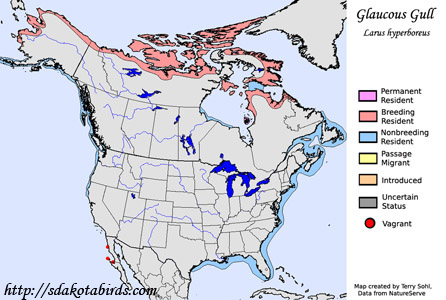 |
|
|
|
|
Glaucous-winged Gull |
Lesser Black-backed Gull |
|
Larus glaucescens |
Larus fuscus |
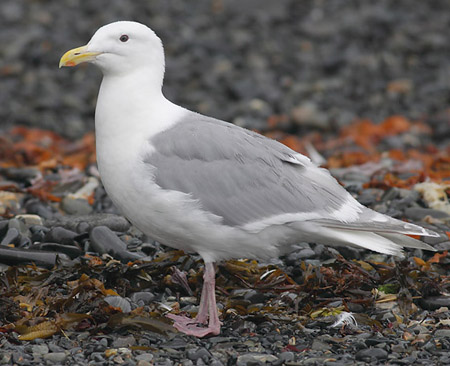
|
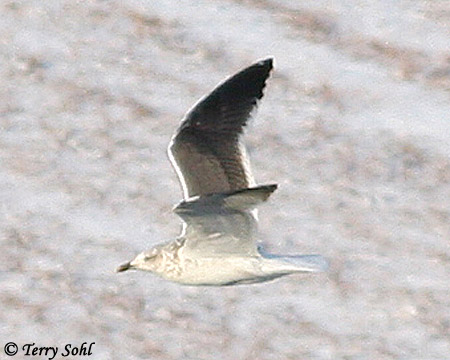
|
|
Length: 26 inches |
Length: 20-22 inches |
|
Wingspan: 58 inches |
Wingspan: 54 inches |
|
Bill: Typically large bill, red spot on lower mandible, pinkish
gape |
Bill: Relatively small yellow bill, red mark on lower bill
(adult) |
|
Legs and Feet: Pink |
Legs and Feet: Yellow |
|
Mantle: Relatively pale gray mantle |
Mantle: Dark Gray, very noticeable compared to all other gulls
on this page (other than Great Black-backed Gull) |
|
Wings: Gray wingtips, similar in color to mantle, with white
subterminal spots |
Wings: Dark gray upperwing with extensive black on primaries,
small white spot towards wingtip. |
|
Head/Eye: Usually a dark iris, but some individuals have a
dirty-yellow iris |
Head/Eye: Clear yellow iris, thin red orbital ring (breeding),
head looks proportionately small compared to other Larus |
|
South Dakota Status: Rare migrant, primarily in late fall and
early winter |
South Dakota Status: Rare migrant, primarily in late fall and
early winter |
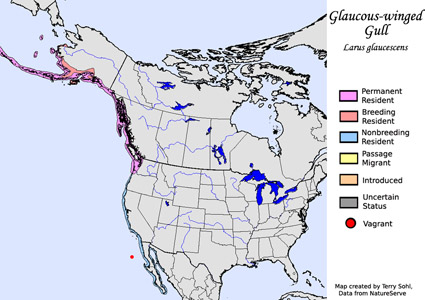 |
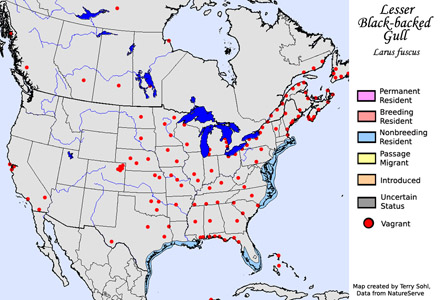 |
|
|
|
|
Great Black-backed Gull |
|
|
Larus marinus |
|
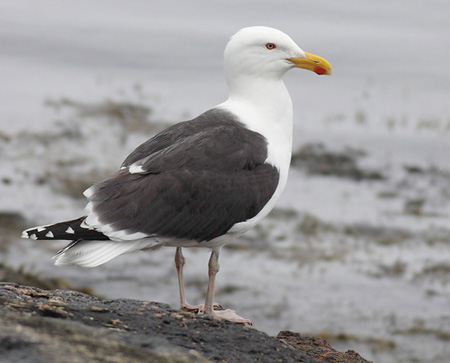
|
|
|
Length: 30 inches |
|
|
Wingspan: 65 inches |
|
|
Bill: Very large and heavy yellow bill with red spot on lower
bill. |
|
|
Legs and Feet: Pale pink |
|
|
Mantle: Very dark mantle, darker than all other Larus on this
page |
|
|
Wings: Dark upperwings, black on primaries with white spots on
wing tips. |
|
|
Head/Eye: Very large head and powerful bill, variable eye, but
usually dirty yellow iris, red orbital ring (breeding). |
|
South Dakota Status: Extremely rare visitor to the state.
|
|
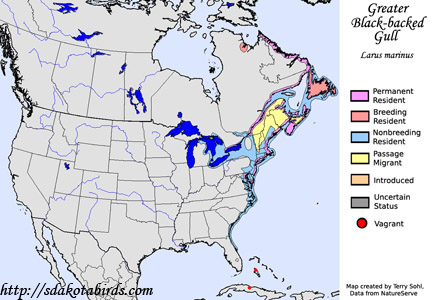 |
|






















